Comprehensive Analysis of Travel and Tourism Sector for TUI Group
VerifiedAdded on 2020/06/05
|13
|4148
|50
Report
AI Summary
This report examines the travel and tourism sector, focusing on the TUI Group. It begins with an introduction highlighting the sector's economic significance. Task 1 analyzes historical developments in travel and tourism, providing a timeline of key events, and then explores the sector's structure, including tour operators, regulatory bodies, and accommodation. Task 2 investigates the functions of government-sponsored bodies and agencies, particularly in the context of TUI Group's expansion, and examines the influence of local and economic policies. It also assesses the implications of political changes on the sector in various countries. Task 3 delves into factors affecting tourism demand and how the TUI Group has adapted to these factors. Finally, Task 4 identifies the positive and negative impacts of tourism and analyzes strategies to mitigate negative effects. The report concludes with a summary of the key findings and provides a list of references.
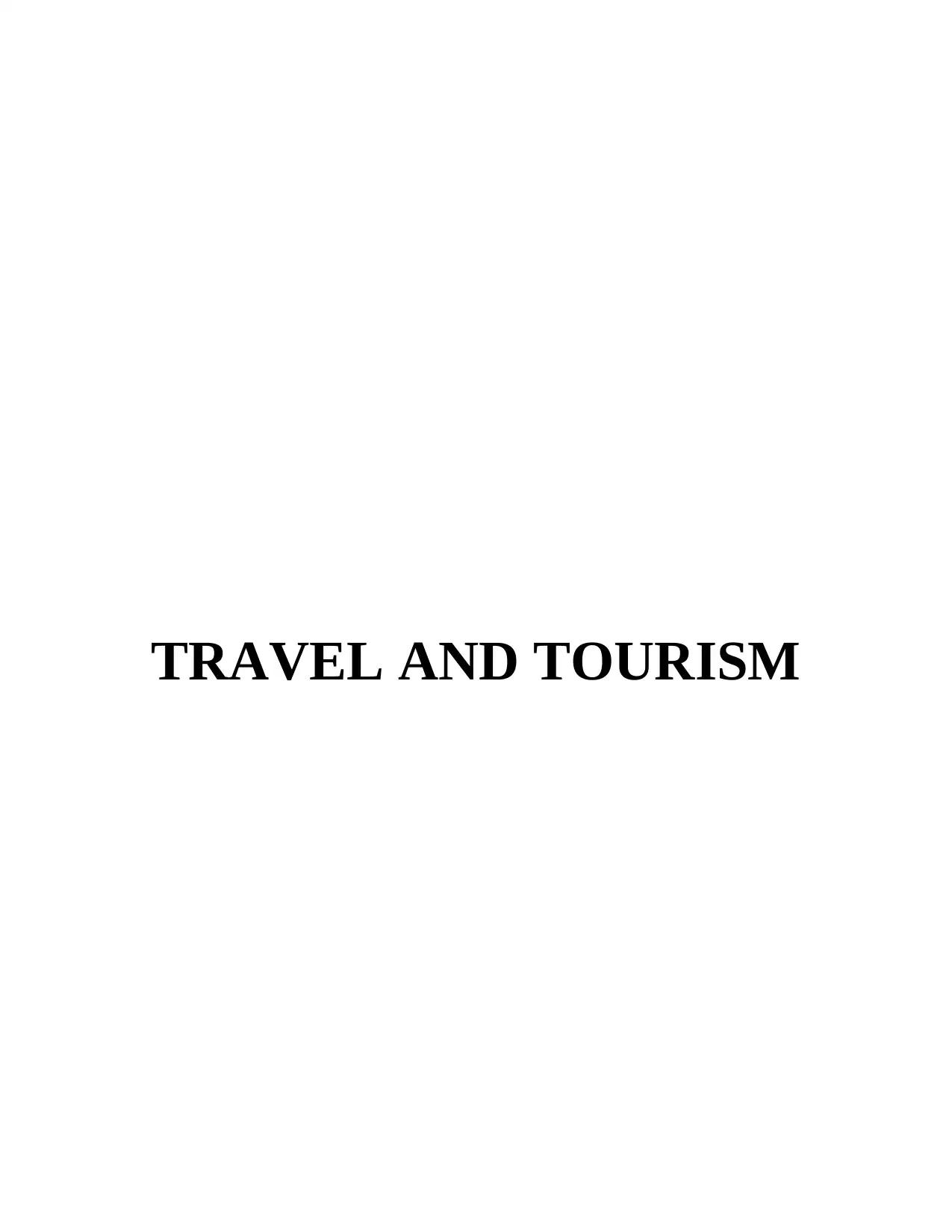
TRAVEL AND TOURISM
Paraphrase This Document
Need a fresh take? Get an instant paraphrase of this document with our AI Paraphraser
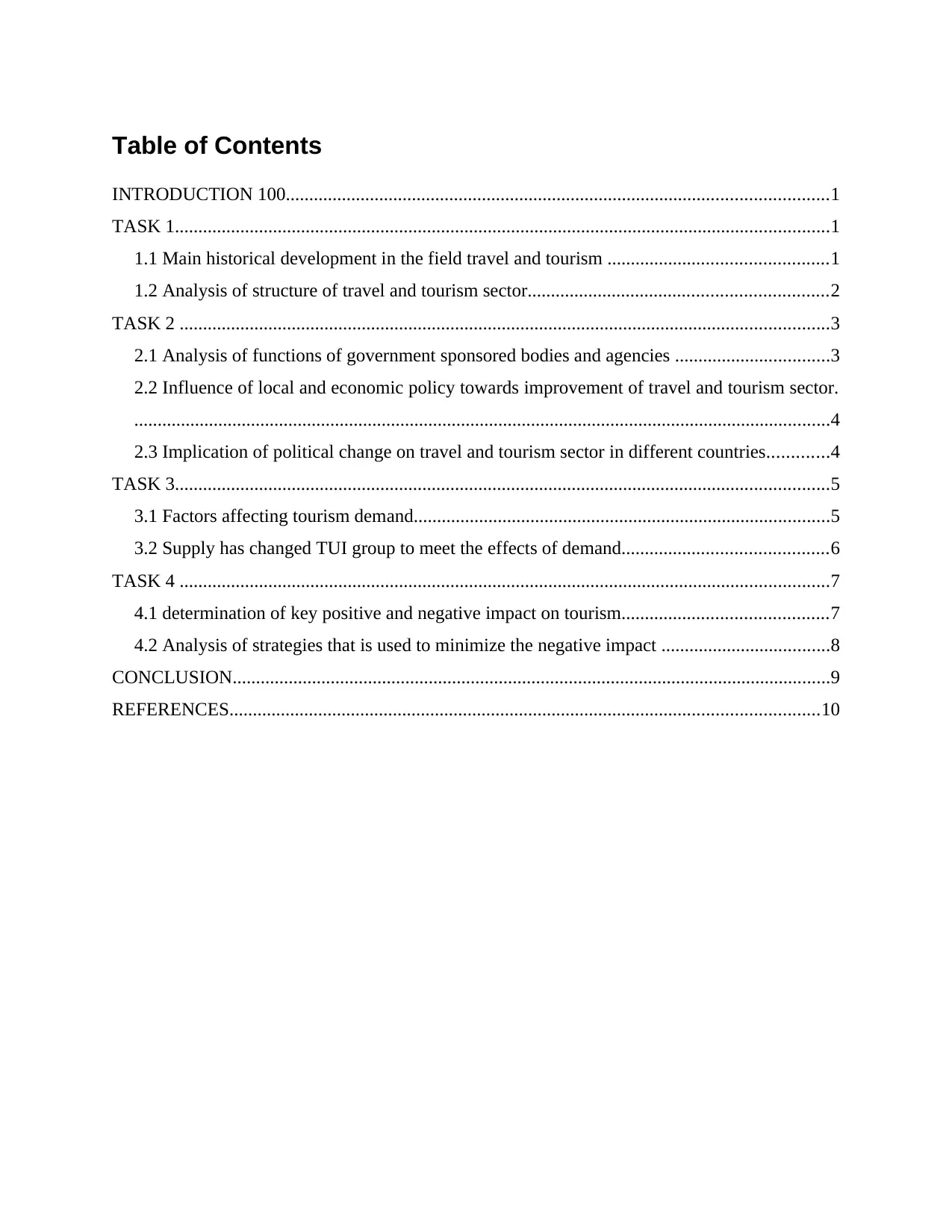
Table of Contents
INTRODUCTION 100....................................................................................................................1
TASK 1............................................................................................................................................1
1.1 Main historical development in the field travel and tourism ...............................................1
1.2 Analysis of structure of travel and tourism sector................................................................2
TASK 2 ...........................................................................................................................................3
2.1 Analysis of functions of government sponsored bodies and agencies .................................3
2.2 Influence of local and economic policy towards improvement of travel and tourism sector.
.....................................................................................................................................................4
2.3 Implication of political change on travel and tourism sector in different countries.............4
TASK 3............................................................................................................................................5
3.1 Factors affecting tourism demand.........................................................................................5
3.2 Supply has changed TUI group to meet the effects of demand............................................6
TASK 4 ...........................................................................................................................................7
4.1 determination of key positive and negative impact on tourism............................................7
4.2 Analysis of strategies that is used to minimize the negative impact ....................................8
CONCLUSION................................................................................................................................9
REFERENCES..............................................................................................................................10
INTRODUCTION 100....................................................................................................................1
TASK 1............................................................................................................................................1
1.1 Main historical development in the field travel and tourism ...............................................1
1.2 Analysis of structure of travel and tourism sector................................................................2
TASK 2 ...........................................................................................................................................3
2.1 Analysis of functions of government sponsored bodies and agencies .................................3
2.2 Influence of local and economic policy towards improvement of travel and tourism sector.
.....................................................................................................................................................4
2.3 Implication of political change on travel and tourism sector in different countries.............4
TASK 3............................................................................................................................................5
3.1 Factors affecting tourism demand.........................................................................................5
3.2 Supply has changed TUI group to meet the effects of demand............................................6
TASK 4 ...........................................................................................................................................7
4.1 determination of key positive and negative impact on tourism............................................7
4.2 Analysis of strategies that is used to minimize the negative impact ....................................8
CONCLUSION................................................................................................................................9
REFERENCES..............................................................................................................................10
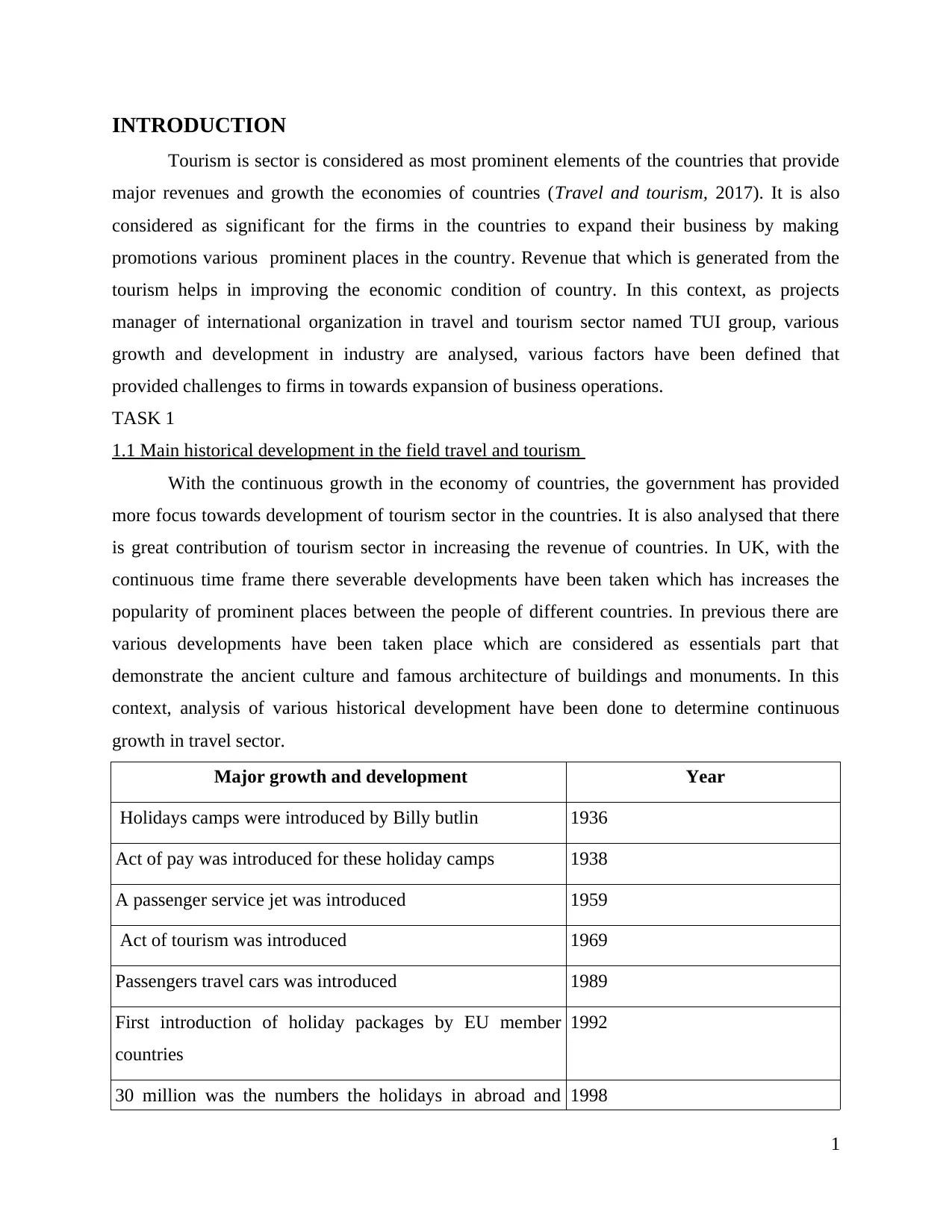
INTRODUCTION
Tourism is sector is considered as most prominent elements of the countries that provide
major revenues and growth the economies of countries (Travel and tourism, 2017). It is also
considered as significant for the firms in the countries to expand their business by making
promotions various prominent places in the country. Revenue that which is generated from the
tourism helps in improving the economic condition of country. In this context, as projects
manager of international organization in travel and tourism sector named TUI group, various
growth and development in industry are analysed, various factors have been defined that
provided challenges to firms in towards expansion of business operations.
TASK 1
1.1 Main historical development in the field travel and tourism
With the continuous growth in the economy of countries, the government has provided
more focus towards development of tourism sector in the countries. It is also analysed that there
is great contribution of tourism sector in increasing the revenue of countries. In UK, with the
continuous time frame there severable developments have been taken which has increases the
popularity of prominent places between the people of different countries. In previous there are
various developments have been taken place which are considered as essentials part that
demonstrate the ancient culture and famous architecture of buildings and monuments. In this
context, analysis of various historical development have been done to determine continuous
growth in travel sector.
Major growth and development Year
Holidays camps were introduced by Billy butlin 1936
Act of pay was introduced for these holiday camps 1938
A passenger service jet was introduced 1959
Act of tourism was introduced 1969
Passengers travel cars was introduced 1989
First introduction of holiday packages by EU member
countries
1992
30 million was the numbers the holidays in abroad and 1998
1
Tourism is sector is considered as most prominent elements of the countries that provide
major revenues and growth the economies of countries (Travel and tourism, 2017). It is also
considered as significant for the firms in the countries to expand their business by making
promotions various prominent places in the country. Revenue that which is generated from the
tourism helps in improving the economic condition of country. In this context, as projects
manager of international organization in travel and tourism sector named TUI group, various
growth and development in industry are analysed, various factors have been defined that
provided challenges to firms in towards expansion of business operations.
TASK 1
1.1 Main historical development in the field travel and tourism
With the continuous growth in the economy of countries, the government has provided
more focus towards development of tourism sector in the countries. It is also analysed that there
is great contribution of tourism sector in increasing the revenue of countries. In UK, with the
continuous time frame there severable developments have been taken which has increases the
popularity of prominent places between the people of different countries. In previous there are
various developments have been taken place which are considered as essentials part that
demonstrate the ancient culture and famous architecture of buildings and monuments. In this
context, analysis of various historical development have been done to determine continuous
growth in travel sector.
Major growth and development Year
Holidays camps were introduced by Billy butlin 1936
Act of pay was introduced for these holiday camps 1938
A passenger service jet was introduced 1959
Act of tourism was introduced 1969
Passengers travel cars was introduced 1989
First introduction of holiday packages by EU member
countries
1992
30 million was the numbers the holidays in abroad and 1998
1
⊘ This is a preview!⊘
Do you want full access?
Subscribe today to unlock all pages.

Trusted by 1+ million students worldwide
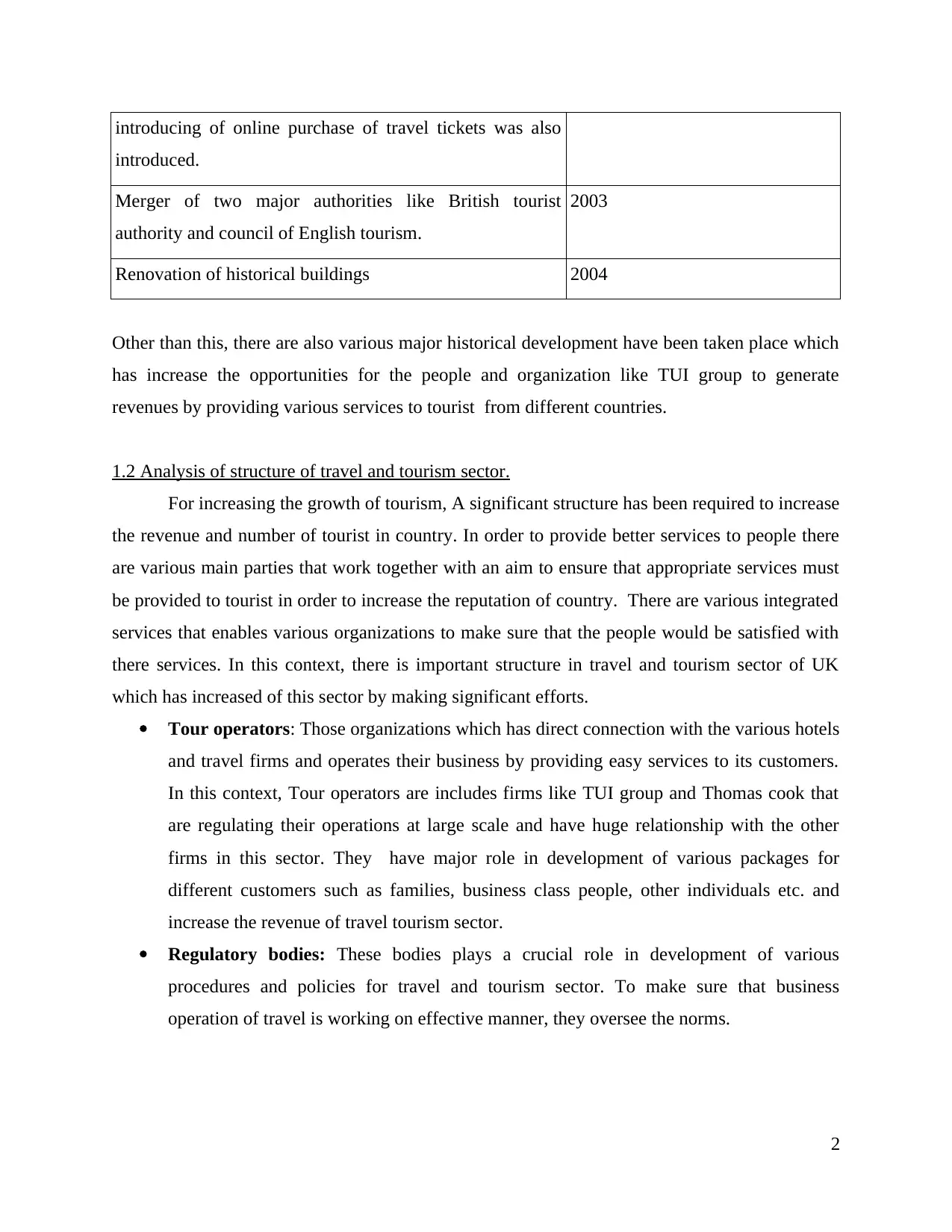
introducing of online purchase of travel tickets was also
introduced.
Merger of two major authorities like British tourist
authority and council of English tourism.
2003
Renovation of historical buildings 2004
Other than this, there are also various major historical development have been taken place which
has increase the opportunities for the people and organization like TUI group to generate
revenues by providing various services to tourist from different countries.
1.2 Analysis of structure of travel and tourism sector.
For increasing the growth of tourism, A significant structure has been required to increase
the revenue and number of tourist in country. In order to provide better services to people there
are various main parties that work together with an aim to ensure that appropriate services must
be provided to tourist in order to increase the reputation of country. There are various integrated
services that enables various organizations to make sure that the people would be satisfied with
there services. In this context, there is important structure in travel and tourism sector of UK
which has increased of this sector by making significant efforts.
Tour operators: Those organizations which has direct connection with the various hotels
and travel firms and operates their business by providing easy services to its customers.
In this context, Tour operators are includes firms like TUI group and Thomas cook that
are regulating their operations at large scale and have huge relationship with the other
firms in this sector. They have major role in development of various packages for
different customers such as families, business class people, other individuals etc. and
increase the revenue of travel tourism sector.
Regulatory bodies: These bodies plays a crucial role in development of various
procedures and policies for travel and tourism sector. To make sure that business
operation of travel is working on effective manner, they oversee the norms.
2
introduced.
Merger of two major authorities like British tourist
authority and council of English tourism.
2003
Renovation of historical buildings 2004
Other than this, there are also various major historical development have been taken place which
has increase the opportunities for the people and organization like TUI group to generate
revenues by providing various services to tourist from different countries.
1.2 Analysis of structure of travel and tourism sector.
For increasing the growth of tourism, A significant structure has been required to increase
the revenue and number of tourist in country. In order to provide better services to people there
are various main parties that work together with an aim to ensure that appropriate services must
be provided to tourist in order to increase the reputation of country. There are various integrated
services that enables various organizations to make sure that the people would be satisfied with
there services. In this context, there is important structure in travel and tourism sector of UK
which has increased of this sector by making significant efforts.
Tour operators: Those organizations which has direct connection with the various hotels
and travel firms and operates their business by providing easy services to its customers.
In this context, Tour operators are includes firms like TUI group and Thomas cook that
are regulating their operations at large scale and have huge relationship with the other
firms in this sector. They have major role in development of various packages for
different customers such as families, business class people, other individuals etc. and
increase the revenue of travel tourism sector.
Regulatory bodies: These bodies plays a crucial role in development of various
procedures and policies for travel and tourism sector. To make sure that business
operation of travel is working on effective manner, they oversee the norms.
2
Paraphrase This Document
Need a fresh take? Get an instant paraphrase of this document with our AI Paraphraser
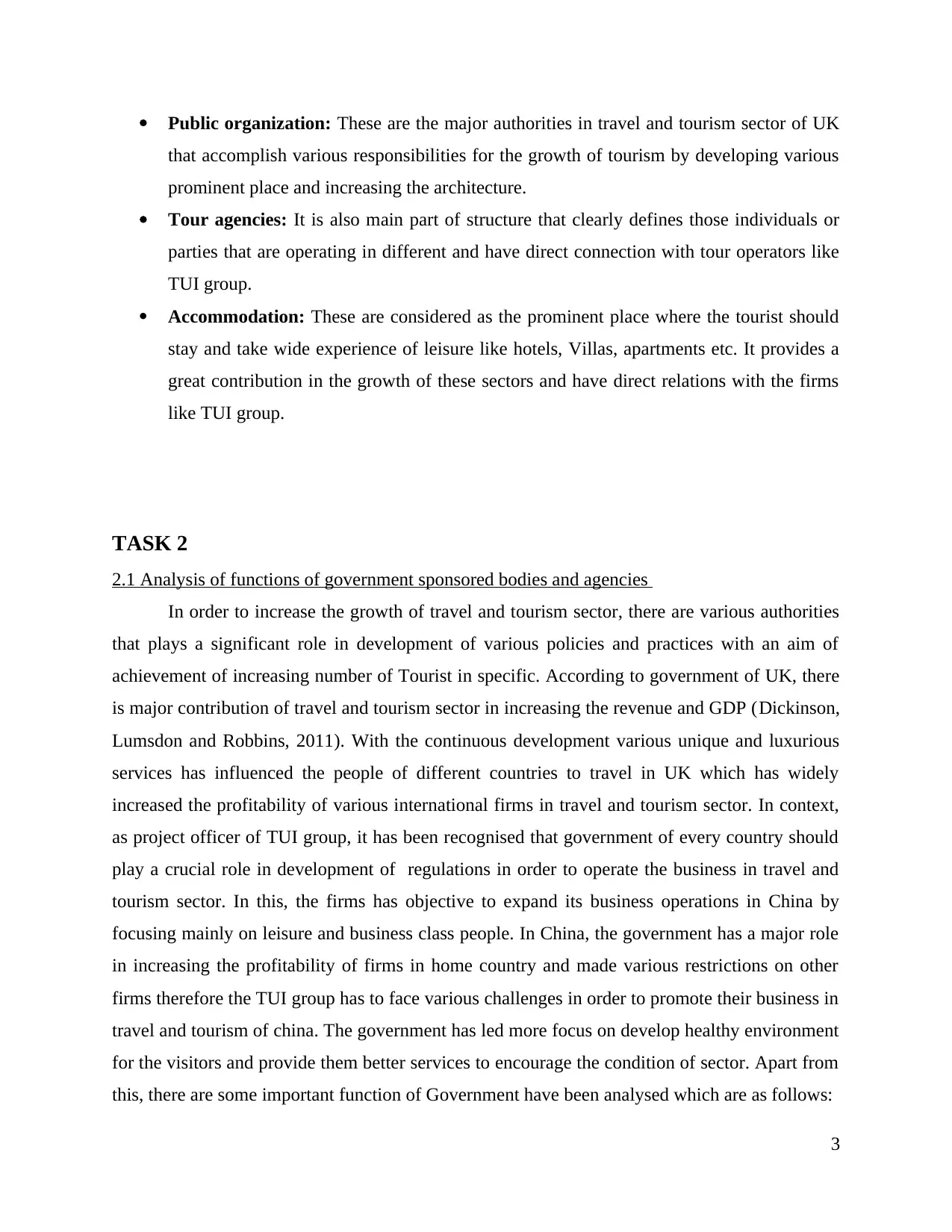
Public organization: These are the major authorities in travel and tourism sector of UK
that accomplish various responsibilities for the growth of tourism by developing various
prominent place and increasing the architecture.
Tour agencies: It is also main part of structure that clearly defines those individuals or
parties that are operating in different and have direct connection with tour operators like
TUI group.
Accommodation: These are considered as the prominent place where the tourist should
stay and take wide experience of leisure like hotels, Villas, apartments etc. It provides a
great contribution in the growth of these sectors and have direct relations with the firms
like TUI group.
TASK 2
2.1 Analysis of functions of government sponsored bodies and agencies
In order to increase the growth of travel and tourism sector, there are various authorities
that plays a significant role in development of various policies and practices with an aim of
achievement of increasing number of Tourist in specific. According to government of UK, there
is major contribution of travel and tourism sector in increasing the revenue and GDP (Dickinson,
Lumsdon and Robbins, 2011). With the continuous development various unique and luxurious
services has influenced the people of different countries to travel in UK which has widely
increased the profitability of various international firms in travel and tourism sector. In context,
as project officer of TUI group, it has been recognised that government of every country should
play a crucial role in development of regulations in order to operate the business in travel and
tourism sector. In this, the firms has objective to expand its business operations in China by
focusing mainly on leisure and business class people. In China, the government has a major role
in increasing the profitability of firms in home country and made various restrictions on other
firms therefore the TUI group has to face various challenges in order to promote their business in
travel and tourism of china. The government has led more focus on develop healthy environment
for the visitors and provide them better services to encourage the condition of sector. Apart from
this, there are some important function of Government have been analysed which are as follows:
3
that accomplish various responsibilities for the growth of tourism by developing various
prominent place and increasing the architecture.
Tour agencies: It is also main part of structure that clearly defines those individuals or
parties that are operating in different and have direct connection with tour operators like
TUI group.
Accommodation: These are considered as the prominent place where the tourist should
stay and take wide experience of leisure like hotels, Villas, apartments etc. It provides a
great contribution in the growth of these sectors and have direct relations with the firms
like TUI group.
TASK 2
2.1 Analysis of functions of government sponsored bodies and agencies
In order to increase the growth of travel and tourism sector, there are various authorities
that plays a significant role in development of various policies and practices with an aim of
achievement of increasing number of Tourist in specific. According to government of UK, there
is major contribution of travel and tourism sector in increasing the revenue and GDP (Dickinson,
Lumsdon and Robbins, 2011). With the continuous development various unique and luxurious
services has influenced the people of different countries to travel in UK which has widely
increased the profitability of various international firms in travel and tourism sector. In context,
as project officer of TUI group, it has been recognised that government of every country should
play a crucial role in development of regulations in order to operate the business in travel and
tourism sector. In this, the firms has objective to expand its business operations in China by
focusing mainly on leisure and business class people. In China, the government has a major role
in increasing the profitability of firms in home country and made various restrictions on other
firms therefore the TUI group has to face various challenges in order to promote their business in
travel and tourism of china. The government has led more focus on develop healthy environment
for the visitors and provide them better services to encourage the condition of sector. Apart from
this, there are some important function of Government have been analysed which are as follows:
3
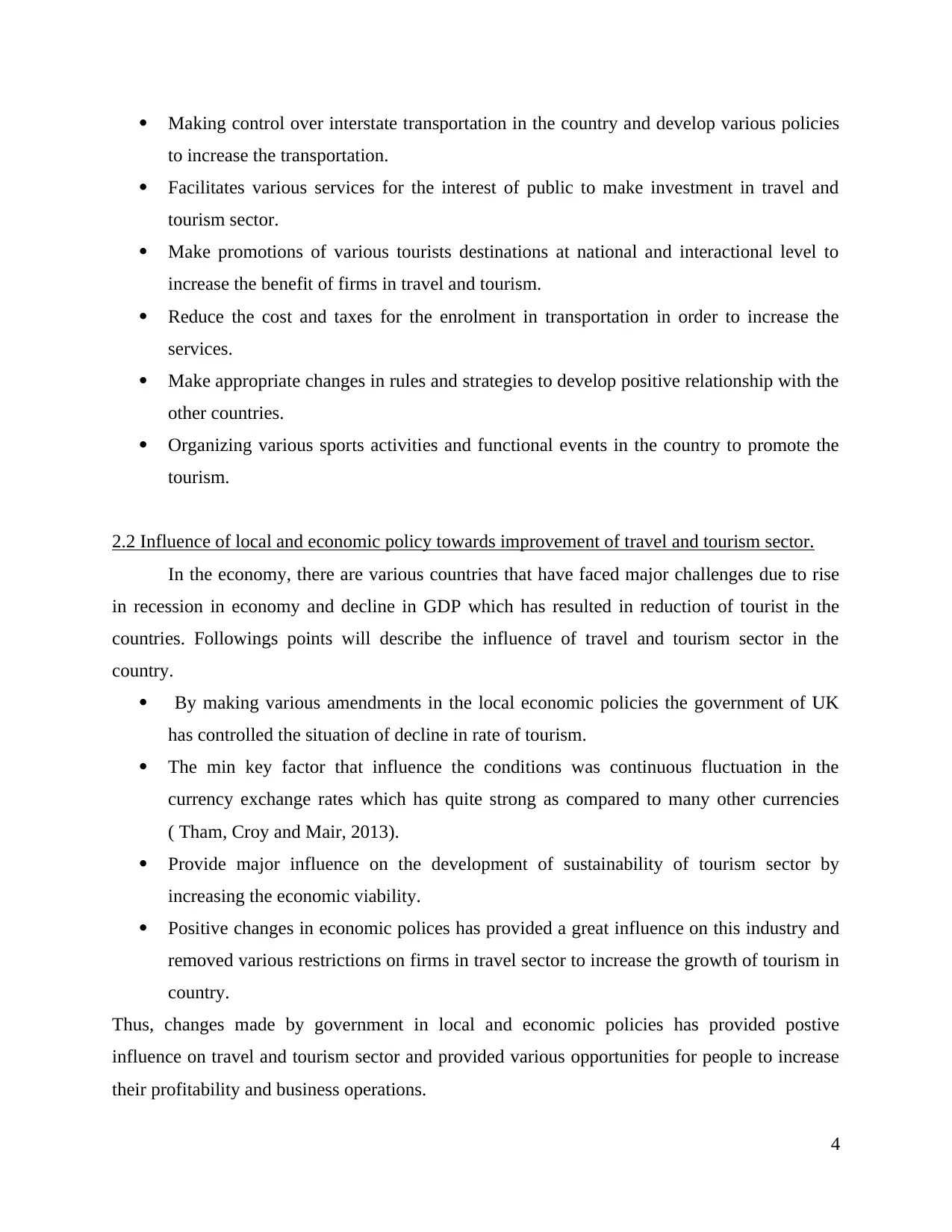
Making control over interstate transportation in the country and develop various policies
to increase the transportation.
Facilitates various services for the interest of public to make investment in travel and
tourism sector.
Make promotions of various tourists destinations at national and interactional level to
increase the benefit of firms in travel and tourism.
Reduce the cost and taxes for the enrolment in transportation in order to increase the
services.
Make appropriate changes in rules and strategies to develop positive relationship with the
other countries.
Organizing various sports activities and functional events in the country to promote the
tourism.
2.2 Influence of local and economic policy towards improvement of travel and tourism sector.
In the economy, there are various countries that have faced major challenges due to rise
in recession in economy and decline in GDP which has resulted in reduction of tourist in the
countries. Followings points will describe the influence of travel and tourism sector in the
country.
By making various amendments in the local economic policies the government of UK
has controlled the situation of decline in rate of tourism.
The min key factor that influence the conditions was continuous fluctuation in the
currency exchange rates which has quite strong as compared to many other currencies
( Tham, Croy and Mair, 2013).
Provide major influence on the development of sustainability of tourism sector by
increasing the economic viability.
Positive changes in economic polices has provided a great influence on this industry and
removed various restrictions on firms in travel sector to increase the growth of tourism in
country.
Thus, changes made by government in local and economic policies has provided postive
influence on travel and tourism sector and provided various opportunities for people to increase
their profitability and business operations.
4
to increase the transportation.
Facilitates various services for the interest of public to make investment in travel and
tourism sector.
Make promotions of various tourists destinations at national and interactional level to
increase the benefit of firms in travel and tourism.
Reduce the cost and taxes for the enrolment in transportation in order to increase the
services.
Make appropriate changes in rules and strategies to develop positive relationship with the
other countries.
Organizing various sports activities and functional events in the country to promote the
tourism.
2.2 Influence of local and economic policy towards improvement of travel and tourism sector.
In the economy, there are various countries that have faced major challenges due to rise
in recession in economy and decline in GDP which has resulted in reduction of tourist in the
countries. Followings points will describe the influence of travel and tourism sector in the
country.
By making various amendments in the local economic policies the government of UK
has controlled the situation of decline in rate of tourism.
The min key factor that influence the conditions was continuous fluctuation in the
currency exchange rates which has quite strong as compared to many other currencies
( Tham, Croy and Mair, 2013).
Provide major influence on the development of sustainability of tourism sector by
increasing the economic viability.
Positive changes in economic polices has provided a great influence on this industry and
removed various restrictions on firms in travel sector to increase the growth of tourism in
country.
Thus, changes made by government in local and economic policies has provided postive
influence on travel and tourism sector and provided various opportunities for people to increase
their profitability and business operations.
4
⊘ This is a preview!⊘
Do you want full access?
Subscribe today to unlock all pages.

Trusted by 1+ million students worldwide
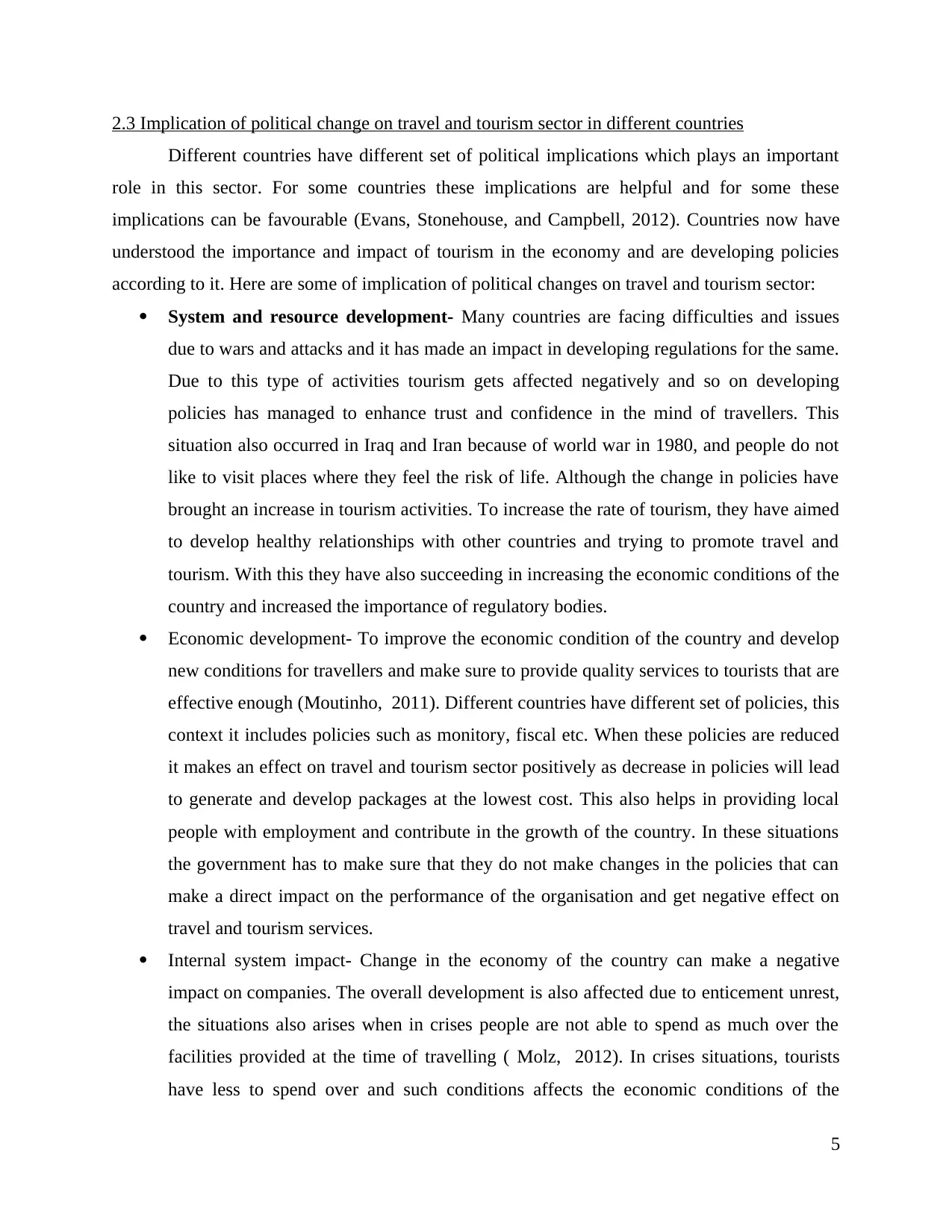
2.3 Implication of political change on travel and tourism sector in different countries
Different countries have different set of political implications which plays an important
role in this sector. For some countries these implications are helpful and for some these
implications can be favourable (Evans, Stonehouse, and Campbell, 2012). Countries now have
understood the importance and impact of tourism in the economy and are developing policies
according to it. Here are some of implication of political changes on travel and tourism sector:
System and resource development- Many countries are facing difficulties and issues
due to wars and attacks and it has made an impact in developing regulations for the same.
Due to this type of activities tourism gets affected negatively and so on developing
policies has managed to enhance trust and confidence in the mind of travellers. This
situation also occurred in Iraq and Iran because of world war in 1980, and people do not
like to visit places where they feel the risk of life. Although the change in policies have
brought an increase in tourism activities. To increase the rate of tourism, they have aimed
to develop healthy relationships with other countries and trying to promote travel and
tourism. With this they have also succeeding in increasing the economic conditions of the
country and increased the importance of regulatory bodies.
Economic development- To improve the economic condition of the country and develop
new conditions for travellers and make sure to provide quality services to tourists that are
effective enough (Moutinho, 2011). Different countries have different set of policies, this
context it includes policies such as monitory, fiscal etc. When these policies are reduced
it makes an effect on travel and tourism sector positively as decrease in policies will lead
to generate and develop packages at the lowest cost. This also helps in providing local
people with employment and contribute in the growth of the country. In these situations
the government has to make sure that they do not make changes in the policies that can
make a direct impact on the performance of the organisation and get negative effect on
travel and tourism services.
Internal system impact- Change in the economy of the country can make a negative
impact on companies. The overall development is also affected due to enticement unrest,
the situations also arises when in crises people are not able to spend as much over the
facilities provided at the time of travelling ( Molz, 2012). In crises situations, tourists
have less to spend over and such conditions affects the economic conditions of the
5
Different countries have different set of political implications which plays an important
role in this sector. For some countries these implications are helpful and for some these
implications can be favourable (Evans, Stonehouse, and Campbell, 2012). Countries now have
understood the importance and impact of tourism in the economy and are developing policies
according to it. Here are some of implication of political changes on travel and tourism sector:
System and resource development- Many countries are facing difficulties and issues
due to wars and attacks and it has made an impact in developing regulations for the same.
Due to this type of activities tourism gets affected negatively and so on developing
policies has managed to enhance trust and confidence in the mind of travellers. This
situation also occurred in Iraq and Iran because of world war in 1980, and people do not
like to visit places where they feel the risk of life. Although the change in policies have
brought an increase in tourism activities. To increase the rate of tourism, they have aimed
to develop healthy relationships with other countries and trying to promote travel and
tourism. With this they have also succeeding in increasing the economic conditions of the
country and increased the importance of regulatory bodies.
Economic development- To improve the economic condition of the country and develop
new conditions for travellers and make sure to provide quality services to tourists that are
effective enough (Moutinho, 2011). Different countries have different set of policies, this
context it includes policies such as monitory, fiscal etc. When these policies are reduced
it makes an effect on travel and tourism sector positively as decrease in policies will lead
to generate and develop packages at the lowest cost. This also helps in providing local
people with employment and contribute in the growth of the country. In these situations
the government has to make sure that they do not make changes in the policies that can
make a direct impact on the performance of the organisation and get negative effect on
travel and tourism services.
Internal system impact- Change in the economy of the country can make a negative
impact on companies. The overall development is also affected due to enticement unrest,
the situations also arises when in crises people are not able to spend as much over the
facilities provided at the time of travelling ( Molz, 2012). In crises situations, tourists
have less to spend over and such conditions affects the economic conditions of the
5
Paraphrase This Document
Need a fresh take? Get an instant paraphrase of this document with our AI Paraphraser
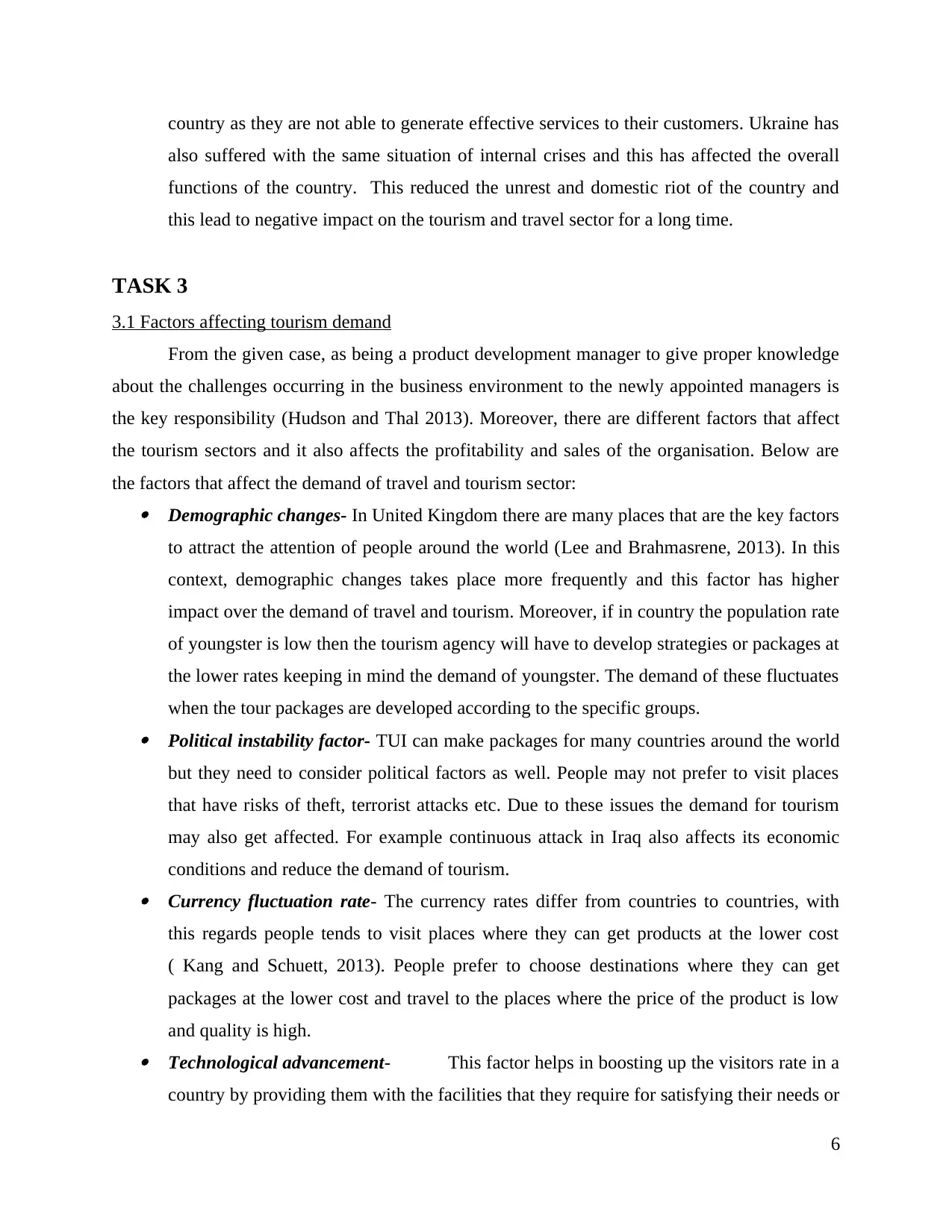
country as they are not able to generate effective services to their customers. Ukraine has
also suffered with the same situation of internal crises and this has affected the overall
functions of the country. This reduced the unrest and domestic riot of the country and
this lead to negative impact on the tourism and travel sector for a long time.
TASK 3
3.1 Factors affecting tourism demand
From the given case, as being a product development manager to give proper knowledge
about the challenges occurring in the business environment to the newly appointed managers is
the key responsibility (Hudson and Thal 2013). Moreover, there are different factors that affect
the tourism sectors and it also affects the profitability and sales of the organisation. Below are
the factors that affect the demand of travel and tourism sector: Demographic changes- In United Kingdom there are many places that are the key factors
to attract the attention of people around the world (Lee and Brahmasrene, 2013). In this
context, demographic changes takes place more frequently and this factor has higher
impact over the demand of travel and tourism. Moreover, if in country the population rate
of youngster is low then the tourism agency will have to develop strategies or packages at
the lower rates keeping in mind the demand of youngster. The demand of these fluctuates
when the tour packages are developed according to the specific groups. Political instability factor- TUI can make packages for many countries around the world
but they need to consider political factors as well. People may not prefer to visit places
that have risks of theft, terrorist attacks etc. Due to these issues the demand for tourism
may also get affected. For example continuous attack in Iraq also affects its economic
conditions and reduce the demand of tourism. Currency fluctuation rate- The currency rates differ from countries to countries, with
this regards people tends to visit places where they can get products at the lower cost
( Kang and Schuett, 2013). People prefer to choose destinations where they can get
packages at the lower cost and travel to the places where the price of the product is low
and quality is high. Technological advancement- This factor helps in boosting up the visitors rate in a
country by providing them with the facilities that they require for satisfying their needs or
6
also suffered with the same situation of internal crises and this has affected the overall
functions of the country. This reduced the unrest and domestic riot of the country and
this lead to negative impact on the tourism and travel sector for a long time.
TASK 3
3.1 Factors affecting tourism demand
From the given case, as being a product development manager to give proper knowledge
about the challenges occurring in the business environment to the newly appointed managers is
the key responsibility (Hudson and Thal 2013). Moreover, there are different factors that affect
the tourism sectors and it also affects the profitability and sales of the organisation. Below are
the factors that affect the demand of travel and tourism sector: Demographic changes- In United Kingdom there are many places that are the key factors
to attract the attention of people around the world (Lee and Brahmasrene, 2013). In this
context, demographic changes takes place more frequently and this factor has higher
impact over the demand of travel and tourism. Moreover, if in country the population rate
of youngster is low then the tourism agency will have to develop strategies or packages at
the lower rates keeping in mind the demand of youngster. The demand of these fluctuates
when the tour packages are developed according to the specific groups. Political instability factor- TUI can make packages for many countries around the world
but they need to consider political factors as well. People may not prefer to visit places
that have risks of theft, terrorist attacks etc. Due to these issues the demand for tourism
may also get affected. For example continuous attack in Iraq also affects its economic
conditions and reduce the demand of tourism. Currency fluctuation rate- The currency rates differ from countries to countries, with
this regards people tends to visit places where they can get products at the lower cost
( Kang and Schuett, 2013). People prefer to choose destinations where they can get
packages at the lower cost and travel to the places where the price of the product is low
and quality is high. Technological advancement- This factor helps in boosting up the visitors rate in a
country by providing them with the facilities that they require for satisfying their needs or
6
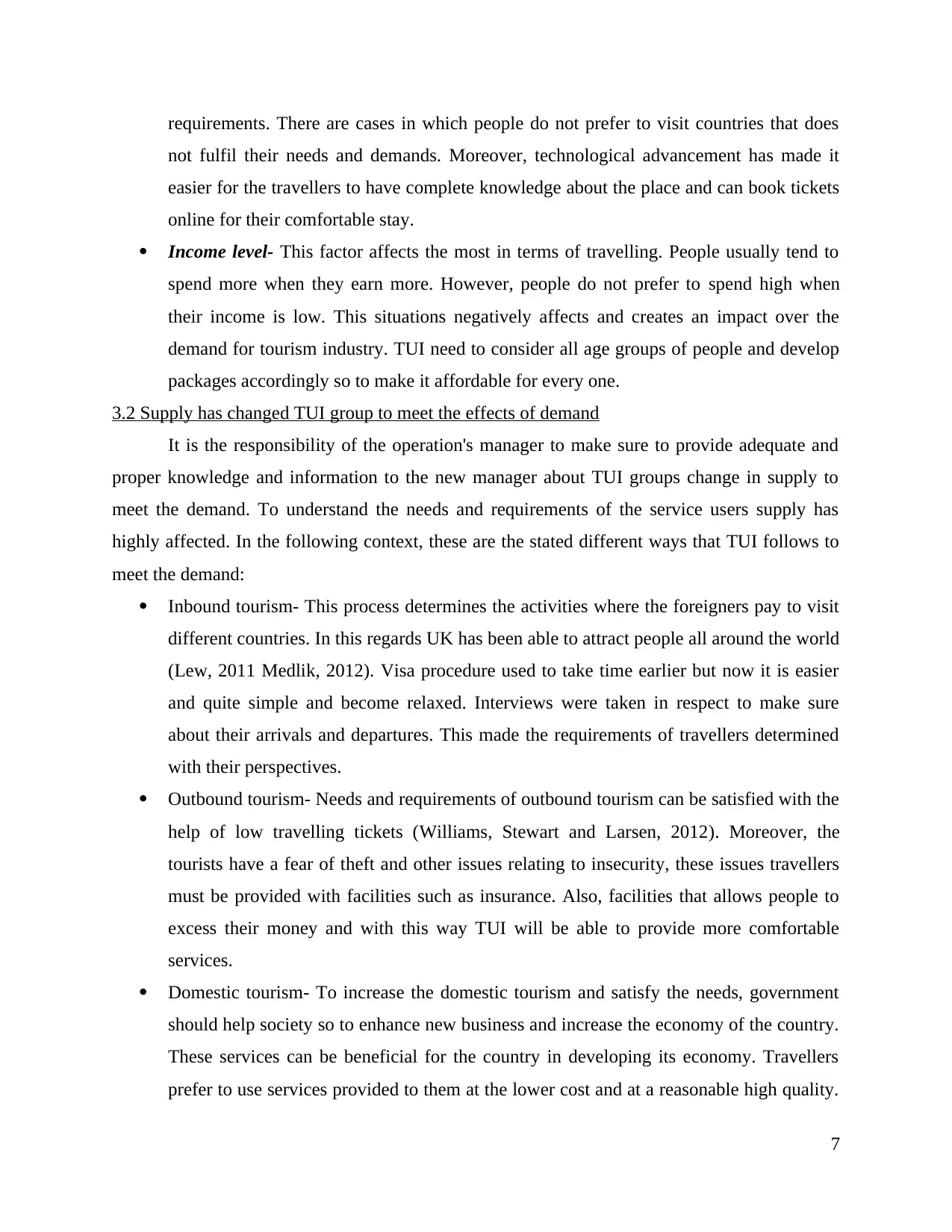
requirements. There are cases in which people do not prefer to visit countries that does
not fulfil their needs and demands. Moreover, technological advancement has made it
easier for the travellers to have complete knowledge about the place and can book tickets
online for their comfortable stay.
Income level- This factor affects the most in terms of travelling. People usually tend to
spend more when they earn more. However, people do not prefer to spend high when
their income is low. This situations negatively affects and creates an impact over the
demand for tourism industry. TUI need to consider all age groups of people and develop
packages accordingly so to make it affordable for every one.
3.2 Supply has changed TUI group to meet the effects of demand
It is the responsibility of the operation's manager to make sure to provide adequate and
proper knowledge and information to the new manager about TUI groups change in supply to
meet the demand. To understand the needs and requirements of the service users supply has
highly affected. In the following context, these are the stated different ways that TUI follows to
meet the demand:
Inbound tourism- This process determines the activities where the foreigners pay to visit
different countries. In this regards UK has been able to attract people all around the world
(Lew, 2011 Medlik, 2012). Visa procedure used to take time earlier but now it is easier
and quite simple and become relaxed. Interviews were taken in respect to make sure
about their arrivals and departures. This made the requirements of travellers determined
with their perspectives.
Outbound tourism- Needs and requirements of outbound tourism can be satisfied with the
help of low travelling tickets (Williams, Stewart and Larsen, 2012). Moreover, the
tourists have a fear of theft and other issues relating to insecurity, these issues travellers
must be provided with facilities such as insurance. Also, facilities that allows people to
excess their money and with this way TUI will be able to provide more comfortable
services.
Domestic tourism- To increase the domestic tourism and satisfy the needs, government
should help society so to enhance new business and increase the economy of the country.
These services can be beneficial for the country in developing its economy. Travellers
prefer to use services provided to them at the lower cost and at a reasonable high quality.
7
not fulfil their needs and demands. Moreover, technological advancement has made it
easier for the travellers to have complete knowledge about the place and can book tickets
online for their comfortable stay.
Income level- This factor affects the most in terms of travelling. People usually tend to
spend more when they earn more. However, people do not prefer to spend high when
their income is low. This situations negatively affects and creates an impact over the
demand for tourism industry. TUI need to consider all age groups of people and develop
packages accordingly so to make it affordable for every one.
3.2 Supply has changed TUI group to meet the effects of demand
It is the responsibility of the operation's manager to make sure to provide adequate and
proper knowledge and information to the new manager about TUI groups change in supply to
meet the demand. To understand the needs and requirements of the service users supply has
highly affected. In the following context, these are the stated different ways that TUI follows to
meet the demand:
Inbound tourism- This process determines the activities where the foreigners pay to visit
different countries. In this regards UK has been able to attract people all around the world
(Lew, 2011 Medlik, 2012). Visa procedure used to take time earlier but now it is easier
and quite simple and become relaxed. Interviews were taken in respect to make sure
about their arrivals and departures. This made the requirements of travellers determined
with their perspectives.
Outbound tourism- Needs and requirements of outbound tourism can be satisfied with the
help of low travelling tickets (Williams, Stewart and Larsen, 2012). Moreover, the
tourists have a fear of theft and other issues relating to insecurity, these issues travellers
must be provided with facilities such as insurance. Also, facilities that allows people to
excess their money and with this way TUI will be able to provide more comfortable
services.
Domestic tourism- To increase the domestic tourism and satisfy the needs, government
should help society so to enhance new business and increase the economy of the country.
These services can be beneficial for the country in developing its economy. Travellers
prefer to use services provided to them at the lower cost and at a reasonable high quality.
7
⊘ This is a preview!⊘
Do you want full access?
Subscribe today to unlock all pages.

Trusted by 1+ million students worldwide
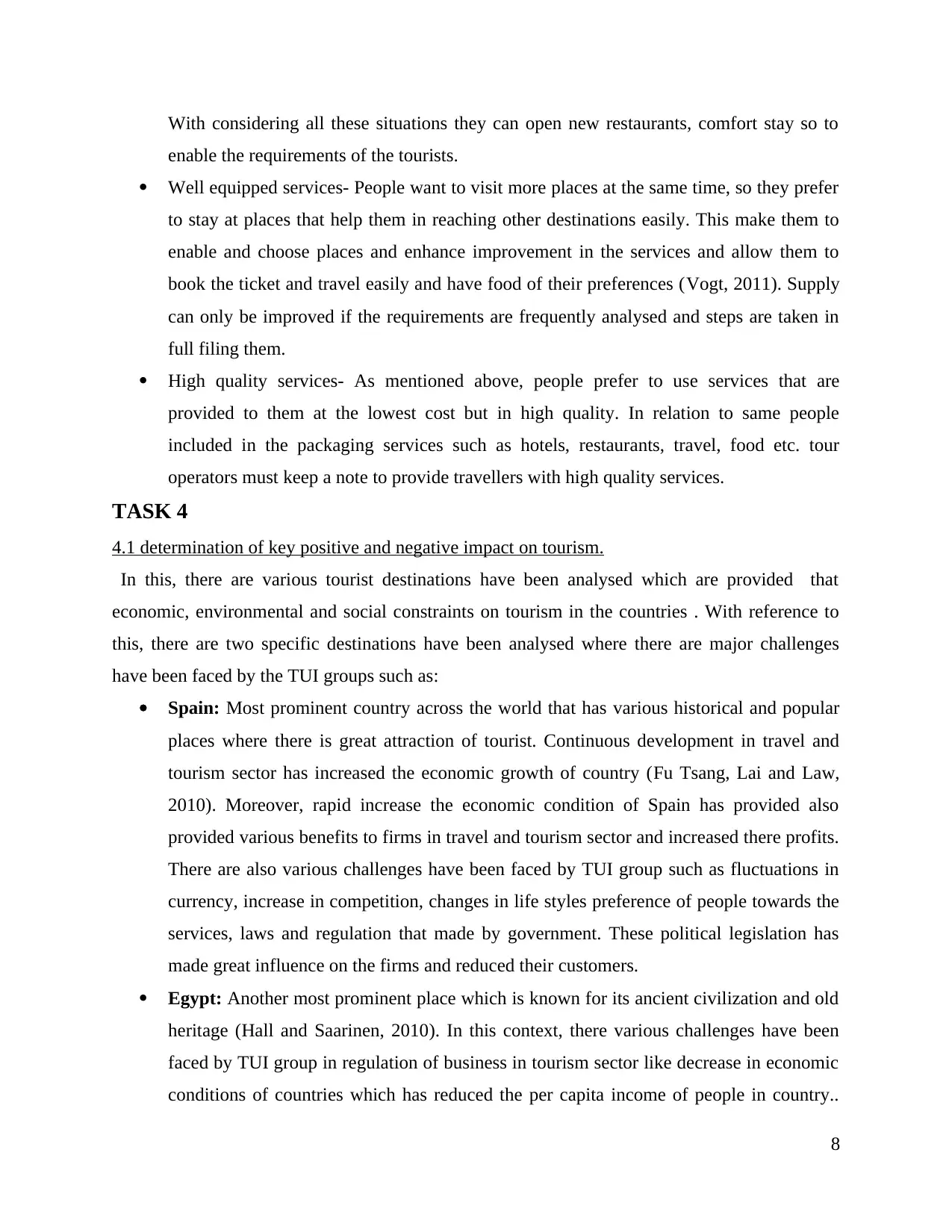
With considering all these situations they can open new restaurants, comfort stay so to
enable the requirements of the tourists.
Well equipped services- People want to visit more places at the same time, so they prefer
to stay at places that help them in reaching other destinations easily. This make them to
enable and choose places and enhance improvement in the services and allow them to
book the ticket and travel easily and have food of their preferences (Vogt, 2011). Supply
can only be improved if the requirements are frequently analysed and steps are taken in
full filing them.
High quality services- As mentioned above, people prefer to use services that are
provided to them at the lowest cost but in high quality. In relation to same people
included in the packaging services such as hotels, restaurants, travel, food etc. tour
operators must keep a note to provide travellers with high quality services.
TASK 4
4.1 determination of key positive and negative impact on tourism.
In this, there are various tourist destinations have been analysed which are provided that
economic, environmental and social constraints on tourism in the countries . With reference to
this, there are two specific destinations have been analysed where there are major challenges
have been faced by the TUI groups such as:
Spain: Most prominent country across the world that has various historical and popular
places where there is great attraction of tourist. Continuous development in travel and
tourism sector has increased the economic growth of country (Fu Tsang, Lai and Law,
2010). Moreover, rapid increase the economic condition of Spain has provided also
provided various benefits to firms in travel and tourism sector and increased there profits.
There are also various challenges have been faced by TUI group such as fluctuations in
currency, increase in competition, changes in life styles preference of people towards the
services, laws and regulation that made by government. These political legislation has
made great influence on the firms and reduced their customers.
Egypt: Another most prominent place which is known for its ancient civilization and old
heritage (Hall and Saarinen, 2010). In this context, there various challenges have been
faced by TUI group in regulation of business in tourism sector like decrease in economic
conditions of countries which has reduced the per capita income of people in country..
8
enable the requirements of the tourists.
Well equipped services- People want to visit more places at the same time, so they prefer
to stay at places that help them in reaching other destinations easily. This make them to
enable and choose places and enhance improvement in the services and allow them to
book the ticket and travel easily and have food of their preferences (Vogt, 2011). Supply
can only be improved if the requirements are frequently analysed and steps are taken in
full filing them.
High quality services- As mentioned above, people prefer to use services that are
provided to them at the lowest cost but in high quality. In relation to same people
included in the packaging services such as hotels, restaurants, travel, food etc. tour
operators must keep a note to provide travellers with high quality services.
TASK 4
4.1 determination of key positive and negative impact on tourism.
In this, there are various tourist destinations have been analysed which are provided that
economic, environmental and social constraints on tourism in the countries . With reference to
this, there are two specific destinations have been analysed where there are major challenges
have been faced by the TUI groups such as:
Spain: Most prominent country across the world that has various historical and popular
places where there is great attraction of tourist. Continuous development in travel and
tourism sector has increased the economic growth of country (Fu Tsang, Lai and Law,
2010). Moreover, rapid increase the economic condition of Spain has provided also
provided various benefits to firms in travel and tourism sector and increased there profits.
There are also various challenges have been faced by TUI group such as fluctuations in
currency, increase in competition, changes in life styles preference of people towards the
services, laws and regulation that made by government. These political legislation has
made great influence on the firms and reduced their customers.
Egypt: Another most prominent place which is known for its ancient civilization and old
heritage (Hall and Saarinen, 2010). In this context, there various challenges have been
faced by TUI group in regulation of business in tourism sector like decrease in economic
conditions of countries which has reduced the per capita income of people in country..
8
Paraphrase This Document
Need a fresh take? Get an instant paraphrase of this document with our AI Paraphraser
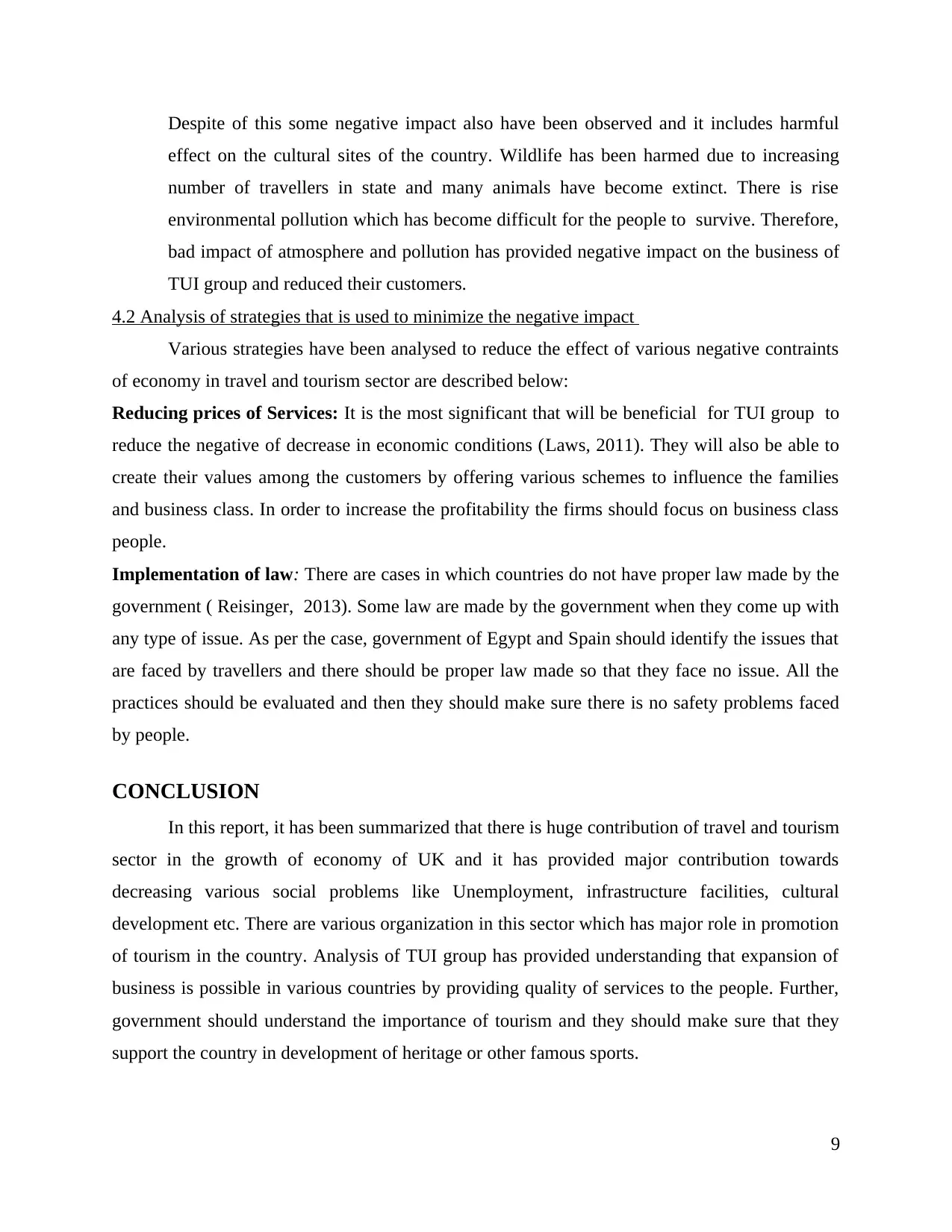
Despite of this some negative impact also have been observed and it includes harmful
effect on the cultural sites of the country. Wildlife has been harmed due to increasing
number of travellers in state and many animals have become extinct. There is rise
environmental pollution which has become difficult for the people to survive. Therefore,
bad impact of atmosphere and pollution has provided negative impact on the business of
TUI group and reduced their customers.
4.2 Analysis of strategies that is used to minimize the negative impact
Various strategies have been analysed to reduce the effect of various negative contraints
of economy in travel and tourism sector are described below:
Reducing prices of Services: It is the most significant that will be beneficial for TUI group to
reduce the negative of decrease in economic conditions (Laws, 2011). They will also be able to
create their values among the customers by offering various schemes to influence the families
and business class. In order to increase the profitability the firms should focus on business class
people.
Implementation of law: There are cases in which countries do not have proper law made by the
government ( Reisinger, 2013). Some law are made by the government when they come up with
any type of issue. As per the case, government of Egypt and Spain should identify the issues that
are faced by travellers and there should be proper law made so that they face no issue. All the
practices should be evaluated and then they should make sure there is no safety problems faced
by people.
CONCLUSION
In this report, it has been summarized that there is huge contribution of travel and tourism
sector in the growth of economy of UK and it has provided major contribution towards
decreasing various social problems like Unemployment, infrastructure facilities, cultural
development etc. There are various organization in this sector which has major role in promotion
of tourism in the country. Analysis of TUI group has provided understanding that expansion of
business is possible in various countries by providing quality of services to the people. Further,
government should understand the importance of tourism and they should make sure that they
support the country in development of heritage or other famous sports.
9
effect on the cultural sites of the country. Wildlife has been harmed due to increasing
number of travellers in state and many animals have become extinct. There is rise
environmental pollution which has become difficult for the people to survive. Therefore,
bad impact of atmosphere and pollution has provided negative impact on the business of
TUI group and reduced their customers.
4.2 Analysis of strategies that is used to minimize the negative impact
Various strategies have been analysed to reduce the effect of various negative contraints
of economy in travel and tourism sector are described below:
Reducing prices of Services: It is the most significant that will be beneficial for TUI group to
reduce the negative of decrease in economic conditions (Laws, 2011). They will also be able to
create their values among the customers by offering various schemes to influence the families
and business class. In order to increase the profitability the firms should focus on business class
people.
Implementation of law: There are cases in which countries do not have proper law made by the
government ( Reisinger, 2013). Some law are made by the government when they come up with
any type of issue. As per the case, government of Egypt and Spain should identify the issues that
are faced by travellers and there should be proper law made so that they face no issue. All the
practices should be evaluated and then they should make sure there is no safety problems faced
by people.
CONCLUSION
In this report, it has been summarized that there is huge contribution of travel and tourism
sector in the growth of economy of UK and it has provided major contribution towards
decreasing various social problems like Unemployment, infrastructure facilities, cultural
development etc. There are various organization in this sector which has major role in promotion
of tourism in the country. Analysis of TUI group has provided understanding that expansion of
business is possible in various countries by providing quality of services to the people. Further,
government should understand the importance of tourism and they should make sure that they
support the country in development of heritage or other famous sports.
9
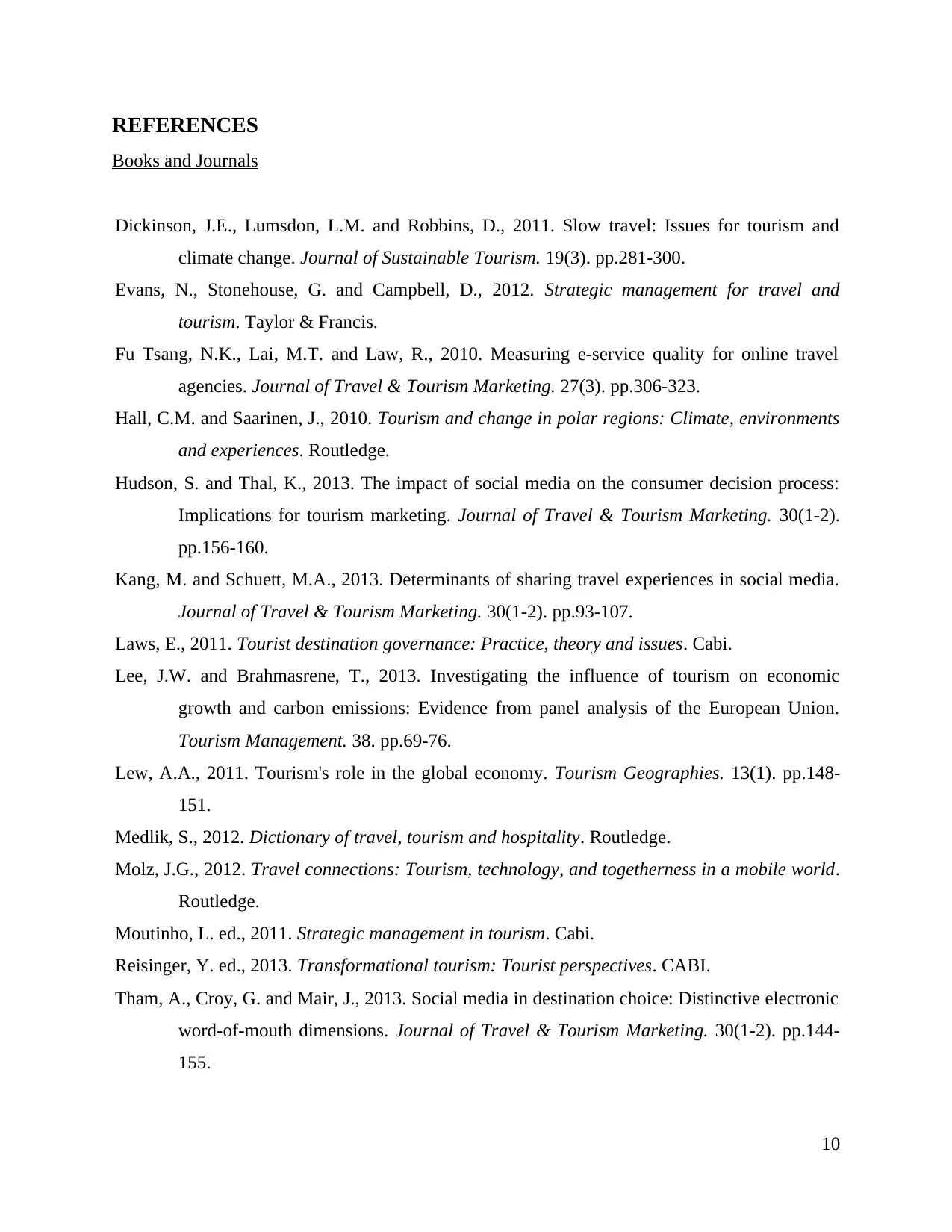
REFERENCES
Books and Journals
Dickinson, J.E., Lumsdon, L.M. and Robbins, D., 2011. Slow travel: Issues for tourism and
climate change. Journal of Sustainable Tourism. 19(3). pp.281-300.
Evans, N., Stonehouse, G. and Campbell, D., 2012. Strategic management for travel and
tourism. Taylor & Francis.
Fu Tsang, N.K., Lai, M.T. and Law, R., 2010. Measuring e-service quality for online travel
agencies. Journal of Travel & Tourism Marketing. 27(3). pp.306-323.
Hall, C.M. and Saarinen, J., 2010. Tourism and change in polar regions: Climate, environments
and experiences. Routledge.
Hudson, S. and Thal, K., 2013. The impact of social media on the consumer decision process:
Implications for tourism marketing. Journal of Travel & Tourism Marketing. 30(1-2).
pp.156-160.
Kang, M. and Schuett, M.A., 2013. Determinants of sharing travel experiences in social media.
Journal of Travel & Tourism Marketing. 30(1-2). pp.93-107.
Laws, E., 2011. Tourist destination governance: Practice, theory and issues. Cabi.
Lee, J.W. and Brahmasrene, T., 2013. Investigating the influence of tourism on economic
growth and carbon emissions: Evidence from panel analysis of the European Union.
Tourism Management. 38. pp.69-76.
Lew, A.A., 2011. Tourism's role in the global economy. Tourism Geographies. 13(1). pp.148-
151.
Medlik, S., 2012. Dictionary of travel, tourism and hospitality. Routledge.
Molz, J.G., 2012. Travel connections: Tourism, technology, and togetherness in a mobile world.
Routledge.
Moutinho, L. ed., 2011. Strategic management in tourism. Cabi.
Reisinger, Y. ed., 2013. Transformational tourism: Tourist perspectives. CABI.
Tham, A., Croy, G. and Mair, J., 2013. Social media in destination choice: Distinctive electronic
word-of-mouth dimensions. Journal of Travel & Tourism Marketing. 30(1-2). pp.144-
155.
10
Books and Journals
Dickinson, J.E., Lumsdon, L.M. and Robbins, D., 2011. Slow travel: Issues for tourism and
climate change. Journal of Sustainable Tourism. 19(3). pp.281-300.
Evans, N., Stonehouse, G. and Campbell, D., 2012. Strategic management for travel and
tourism. Taylor & Francis.
Fu Tsang, N.K., Lai, M.T. and Law, R., 2010. Measuring e-service quality for online travel
agencies. Journal of Travel & Tourism Marketing. 27(3). pp.306-323.
Hall, C.M. and Saarinen, J., 2010. Tourism and change in polar regions: Climate, environments
and experiences. Routledge.
Hudson, S. and Thal, K., 2013. The impact of social media on the consumer decision process:
Implications for tourism marketing. Journal of Travel & Tourism Marketing. 30(1-2).
pp.156-160.
Kang, M. and Schuett, M.A., 2013. Determinants of sharing travel experiences in social media.
Journal of Travel & Tourism Marketing. 30(1-2). pp.93-107.
Laws, E., 2011. Tourist destination governance: Practice, theory and issues. Cabi.
Lee, J.W. and Brahmasrene, T., 2013. Investigating the influence of tourism on economic
growth and carbon emissions: Evidence from panel analysis of the European Union.
Tourism Management. 38. pp.69-76.
Lew, A.A., 2011. Tourism's role in the global economy. Tourism Geographies. 13(1). pp.148-
151.
Medlik, S., 2012. Dictionary of travel, tourism and hospitality. Routledge.
Molz, J.G., 2012. Travel connections: Tourism, technology, and togetherness in a mobile world.
Routledge.
Moutinho, L. ed., 2011. Strategic management in tourism. Cabi.
Reisinger, Y. ed., 2013. Transformational tourism: Tourist perspectives. CABI.
Tham, A., Croy, G. and Mair, J., 2013. Social media in destination choice: Distinctive electronic
word-of-mouth dimensions. Journal of Travel & Tourism Marketing. 30(1-2). pp.144-
155.
10
⊘ This is a preview!⊘
Do you want full access?
Subscribe today to unlock all pages.

Trusted by 1+ million students worldwide
1 out of 13
Related Documents
Your All-in-One AI-Powered Toolkit for Academic Success.
+13062052269
info@desklib.com
Available 24*7 on WhatsApp / Email
![[object Object]](/_next/static/media/star-bottom.7253800d.svg)
Unlock your academic potential
Copyright © 2020–2026 A2Z Services. All Rights Reserved. Developed and managed by ZUCOL.





